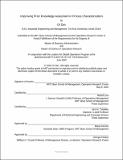Improving prior knowledge assessment in process characterization
Author(s)
Dan, Or.
Download1191622709-MIT.pdf (2.485Mb)
Other Contributors
Sloan School of Management.
Massachusetts Institute of Technology. Operations Research Center.
Leaders for Global Operations Program.
Advisor
Retsef Levi and John N. Tsitsiklis.
Terms of use
Metadata
Show full item recordAbstract
A critical aspect of biologics manufacturing is creating a safe, reliable and consistent manufacturing process. The manufacturing process design includes process characterization (PC) experiments to demonstrate process robustness and provide data necessary for planning, risk mitigation, development of the control strategy, and successful execution of process validation. Performing PC experiments is resource intensive, both human and capital, so leveraging prior knowledge from previous experiments is essential. Until now, using data from past experiments data relied on a centralized static document called Prior Knowledge Assessment (PKA). The PKA aggregates the results of many statistical models that were created during past PC studies. Using the PKA provides insight, but leaves a lot of room for subjective decision making around questions, such as: How should products be grouped together? and What operating parameters are more important? The PKA also lacks uncertainty quantification for statistical significance. In this thesis, we aggregated data from past PC experiments across multiple molecules, and developed a machine learning framework to holistically analyze cross-product data from process characterization DOE studies. The model developed through this project provides interpretable predictions of sensitivity of Performance Indicators to Process Parameters variation. The model enables, for the first time, to assess and quantify the impact of parameters on indicators, even if they were not tested originally for a specific molecule. A novel user interface was created in order to bring the framework to life and create a "one-stop shop" for a scientist to interact with the model. This work improves process characterization decision quality. Potential benefits of this approach would be to increase speed and agility in process development and reduce number of future experiments.
Description
Thesis: M.B.A., Massachusetts Institute of Technology, Sloan School of Management, in conjunction with the Leaders for Global Operations Program at MIT, May, 2020 Thesis: S.M., Massachusetts Institute of Technology, Sloan School of Management, Operations Research Center, in conjunction with the Leaders for Global Operations Program at MIT, May, 2020 Cataloged from the official PDF of thesis. Includes bibliographical references (page 64).
Date issued
2020Department
Sloan School of Management; Massachusetts Institute of Technology. Operations Research Center; Leaders for Global Operations Program at MITPublisher
Massachusetts Institute of Technology
Keywords
Sloan School of Management., Operations Research Center., Leaders for Global Operations Program.